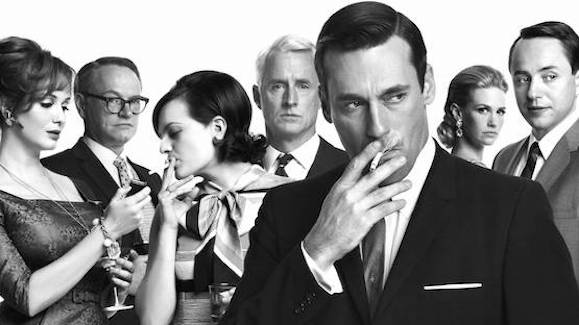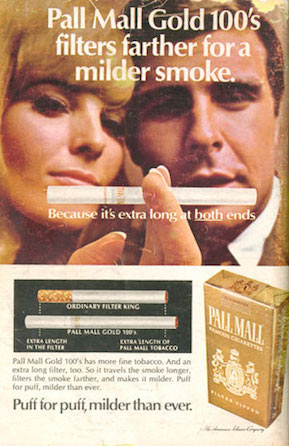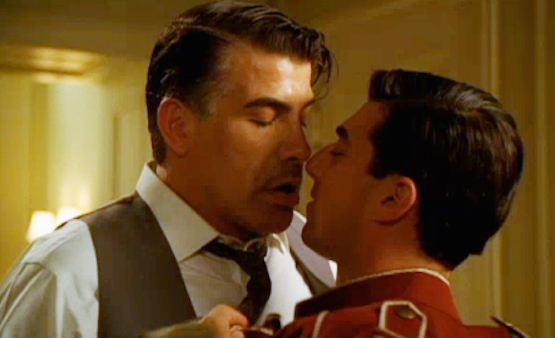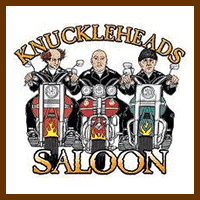 In a couple of weeks, the last season of “Mad Men,” AMC’s award winning drama series, will begin…
In a couple of weeks, the last season of “Mad Men,” AMC’s award winning drama series, will begin…
Greeted with both critical and popular acclaim when it debuted in 2007, the show has gone from strength to strength and Matthew Weiner, its creator, has promised it will go out on a high note.
I was intrigued with the premise of the show, i.e. the lives of a group of men and women working in an up and coming Madison Avenue advertising agency in the 1960’s. I’ve known people who were in the “ad game” during that era and they made it sound like a fun and exciting time, if a little manic at moments. (Hence the series’ title!)
However, I’d not actually sat down to watch the show until a long snowy weekend this winter made for a “binge” viewing session. (That’s also how I got into ‘The Sopranos” initially.)
By the time I’d seen the first four seasons, I was curious as to how critics had treated it.
Imagine my irritation when I realized that while virtually all the reviews were favorable, the single most influential critic was Daniel Mendelsohn, who panned the show in unequivocal terms. (You will recall that Danny-boy was the snark-meister who trashed my friend’s book on the Parthenon. See ‘The Hunting of The Snark; 1-27-15.)
It’s one thing, however, for a critic to attack a work on classical archaeology, quite another to take on a revered cable TV series with millions of fans.
What are Mendelsohn’s credentials in this area, after all?
His background is in literature. I don’t see that he has had any experience in the theater, in movies, or in television. His dismissal of the show’s acting (“bland and sometimes amateurish”), plotting (“haphazard and often preposterous”), characterizations (“shallow and sometimes incoherent”), and writing (“extremely weak”), strikes one as both hyperbolic and uniformed.
After all, one’s professional standing is ultimately best determined by those who understand a genre’s standards, a jury of one’s peers. The boat-load of awards the program has garnered within the entertainment world- Emmy’s, Golden Globe Awards, The Screen Actors Guild, and the Writer’s Guild of America- are determinative of the workmanship and professionalism of the program’s directors, writers, and actors.
 You can argue, though, that demonstrated skill in handling the medium of television leaves unaddressed the content or substance of the show and that’s where Critic Mendelsohn’s sterling academic and cultural credentials cast the deciding vote.
You can argue, though, that demonstrated skill in handling the medium of television leaves unaddressed the content or substance of the show and that’s where Critic Mendelsohn’s sterling academic and cultural credentials cast the deciding vote.
Once one penetrates the pretentious lit-crit veneer of his hit piece (“Sophoclean geometry”, “Aeschylean moral texture”) his argument, however, comes down to four simplistic points. (Mendelsohn would no doubt say these were “reductionist,” which is pseudo-intellectual for “overly simplified.”)
First, he says, the show’s depiction of the ‘60s is as shallow as it is romanticized. The world of Madison Avenue is “lushly reimagined” and is used in such a way as to sell an “alluring historical fantasy.” All the problematic social attitudes of that era are deployed in a crudely exaggerated way to give those fantasies and (for some) memories “significant potency.”
However, one has only to look at contemporaneous depictions of that world to know that Matthew Weiner’s take was anything but over the top.
Sloane Wilson’s canonical 1955 novel ‘The Man in The Grey Flannel Suit”, which deals with the world of public relations (next-of-kin to advertising), is entirely consistent with Mad Men’s portrayal of the Manhattan corporate world. The 1959 Hollywood classic, “The Best of Everything”, about young women going to work in a New York publishing house, has the same world view as Mad Men, echoing the style and the plot devices of the latter.
Finally, we have live testimony from an actual “mad-man” from that era, Jerry Della Femina. A real life counterpart to MM’s protagonist, Don Draper, Della Femina broke into advertising the hard way, through the mail room. He worked his way up to become a named partner in a hugely successful and highly innovative agency. According to him, Mad Men’s portrayal of the louche goings-on in the ad world of the ‘60’s, was, if anything, way understated!
 Secondly. Mendelsohn sniffs the show is the “stuff of soap opera”. It deals in such melodramatic staples as “pregnancy, adulteries, and interracial affairs”. Well so do Charles Dickens (“Great Expectations”), Gustave Flaubert (“Madame Bovary”), and William Shakespeare (“Othello”).
Secondly. Mendelsohn sniffs the show is the “stuff of soap opera”. It deals in such melodramatic staples as “pregnancy, adulteries, and interracial affairs”. Well so do Charles Dickens (“Great Expectations”), Gustave Flaubert (“Madame Bovary”), and William Shakespeare (“Othello”).
How else do people usually screw up (no pun intended!) their lives?
Isn’t there a fine line between drama and melodrama? Isn’t it determined by how the subject is handled and not the subject itself?
Mendelsohn, with his academic and intellectual background, seems to miss the point of Mad Men entirely. The elements he complains of are used to create dramatic tension in a story of people working together to build a business. He grudgingly concedes there are a couple of episodes with real resonance in the series, but complains that they are about power relationships in a business, and less about social issues like sexism and homophobia, that he thinks they were brought in to sign post.
No, it’s a drama about a uniquely American institution, the Madison Avenue ad agency, and the impact of social change on that institution. It’s not just focused on social change itself, however much Mr. Mendelsohn would wish it. Or, as Sam Goldwyn famously said, if you’ve got a message, send a telegram.
The third argument Mendelsohn makes is that MM wants to have it both ways, i.e. it glamorizes drinking, infidelity, and elitism but pretends to abhor and condemn such practices. In his words, the show wants to “shock us but eroticize what it is showing.” But what about the idea that you cannot explain why people succumb to the temptation to behave selfishly and destructively unless you can show why it’s tempting?
As for viewers being enticed to fantasize about an “era of pleasures once taken for granted”, all the characters who behave badly end up paying a steep price, i.e. with their jobs, their marriages, and, in one stark instance, his life. In short, it is hardly a fantasy world of guilt free hedonism as Mendelsohn implies.
The fourth, and final, argument Critic Mendelsohn makes is that the show’s real secret is an appeal to a “touching” nostalgia for its young viewers. Besides displaying his trade mark air of condescension, the argument fails because it is internally inconsistent.
First, he says most viewers are between “19 and 49.” While that’s great from the stand point of advertising demographics, it’s hard to say that people typically indulge in fond reminiscences about a time before they were born.
He then shifts the argument to claim that the audience appeal is to “baby boomers remembering their own childhoods.” That strains credulity because Matthew Weiner himself was born in 1965 and thus was only four years old when the ‘60s -and the series!- ended in 1969. (1964 was the last year of the baby-boom, by the way.)
In the review’s concluding paragraphs, Mendelsohn tells us that the audience is engaging in the collective fantasy of trying to imagine their parents before they were born. He claims this reflects a widely shared desire to tell them that no matter how racist, sexist, classist, etc. they were, we love them anyhow. That’s a message any parent would love to hear and that any child would love to deliver!
For somebody so book smart, Mendelsohn is street dumb.
Mr. Mendelsohn is blind to the show’s main theme; that Don Draper, the self-made man, is a paradigm of the American ideal of upward mobility through reinventing yourself. He literally assumes someone else’s identity so he has taken the idea to its ultimate conclusion, but at huge personal cost. How Mendelsohn misses this lineal descent from Jay Gatsby, Huck Finn, Tom Ripley et al. is beyond me.
 I suspect the actual reason Mendelsohn dislikes Mad Men is a personal one.
I suspect the actual reason Mendelsohn dislikes Mad Men is a personal one.
I think the critic, who is proudly gay, is annoyed at the portrayal of the show’s principal gay character, Sal Romano, the agency’s art director. Sal is shown having a furtive sexual encounter with a bell boy in a hotel while on a business trip. This is accidentally revealed to Don Draper, who later uses it to justify firing Sal when an obnoxious agency client makes his own sexual overture to Sal and is rebuffed. (Contra Mendelsohn, the incident does have consequences in the plot.)
No one likes to be portrayed as hapless victims. That, however, was how life in the closet was in the American corporate world 50 plus years ago. Mendelsohn is killing the messenger.
60’s feminist consciousness raising gave rise to the slogan, “The personal is the political.”
That may be, but the “personal” should not be the “critical”, especially if it means holding a landmark achievement in American popular culture up to “hatred, contempt, and ridicule “because it offends your unstated personal agenda.
Be sure to catch the last season of Mad Men. It tells a lot about ourselves, probably more than we want to know (and more than its harshest critic wants us to know about himself).










Maybe he’s just one of those people who goes through life pushing on doors marked Pull.
The main theme of the show actually is that Don Draper is an invented character based on lies, deceptions and illusions and eventually the ‘man behind the curtain’ is slowly revealed for what he really is. How he deals with those exposures and naked truths is what makes the show interesting. Wiener is holding a mirror of American society at that time through a filtered lens to a modern audience.
Dead on. The British author,Anthony Powell, talks about the characters’ in his novels” personal myth”. It’s a self-concept that has often has little, if any, relation to their actual personal circumstance. The corollary to your insight is that advertising,particularly in its heyday in that era, traffics in fantasy and illusion. I’ll have to admit that Mendelsohn is very good on this point in his review. The guy is brilliant,writes as well as anyone out there,but I really think he misses the boat on the whole in his reviews of this TV series and the book on the Parthenon. I promise to praise him if he does something I like,which may come up very soon because I see he’s just published a piece in The New Yorker on the ancient Greek poet Sappho.
I honestly tried to finish this article, but the boredom overtook me and I had to bail midstream. The gist of article from what I gathered is a critic who was critical of your friend’s book, was also critical of Mad Men, so you are using this criticism to be critical of him. Am I right?
Only in part! I loved Mad Men,watched the first six seasons in January,a total of forty-two episodes. I was curious what the critical response was,i.e. what professional critics thought the show’s strengths and weaknesses were and how they explained its huge following. Imagine my surprise and annoyance when I found out the only pan came from a single critic-unfortunately hugely influential !- who happened to be the same person who trashed my friend’s book. I also saw that he engaged in the same kind of snarky tactics in both reviews,i.e. saying that both works’ inspiration was childishly “touching”. My son,a writer,laughed and said the popular outcry against Mendelsohn’s piece was enormous. Don’t “dis” peoples’ favorite TV show ! I thought I’d join in the fun.
KCConfidential gone scholarly?
This piece reminded of something I had to write for my (worthless) film class back in college.
Not complaining; it’s just…different from what you normally expect on here. Keep’em coming, Sutherland.
And Jon Hamm recently attending rehab? Talk about how life imitates art.
Let’s not get too high falutin’ ! It’s not like we’re analyzing some obscure French art film. (When I was in college taking film criticism, Czech movies were all the rage.) After all,the show can be loosely described as what my senior partner at my old law firm called a “corporate grab a–“story. Why not just enjoy it? I love the music sequence they played at the end of each episode,with songs that related to the plot and characters,from the exact time period being portrayed in that particular show. The actors and actresses are attractive and stylish. I think the critic I’m hammering prefers something like the pretentious “Angels In America”,so we can be preached at from the p.c .prayer book. Give me a pop culture masterwork any day,rather than what passes now for high art .
Jon Hamm is a good friend of mine and his exit from rehab was a good life move for him. Hollywood has changed him financially, physically and mentally. He will come out of this just fine. Look at his background going back to St. Louis and the character in Mad Men was a great part for him.
He is a St. Louis kid, that place will toughen you up for anything.
I read your piece, called 3 friends of mine who read kcconfidential and we all agreed, this is one of your most brilliant takes.
The nuance, the depth, the breadth… Hearne must be married to your sister.
There is, apparently, no pitch you can’t hit.
Great article.
Thanks for editing that Hearne, although the cuss words from 4 construction workers were actually the highest compliment we could have paid him.
🙂
As a long-time “Mad Men” viewer, I’ve come to the conclusion that watching the highly interesting ’60s office environment is more entertaining than the plot or characters. I’ve been disappointed that the show doesn’t have the “stick to the cerebral ribs” ability that I was hoping for, an admittedly terribly high standard, but it’s still better than much of what’s on TV.
Hey Roger, wanna go drop some window pane since it is Friday?
Excellent take on what is one of TV’s best all-time series. Another reason that the show succeeds is that it does not treat the past with neo-puritanical fussiness that we have come to expect from the media. Sure, people smoke on airplanes, litter, tell jokes about people’s race and orientation, openly ogle large breasted women, let their kids bounce around without seat belts and even wear plastic bags over their heads. So what? These folks just won WW II and checked the commies in Korea. They earned the slack the producers cut them.
Another out of the park piece. I really enjoy everything you do!